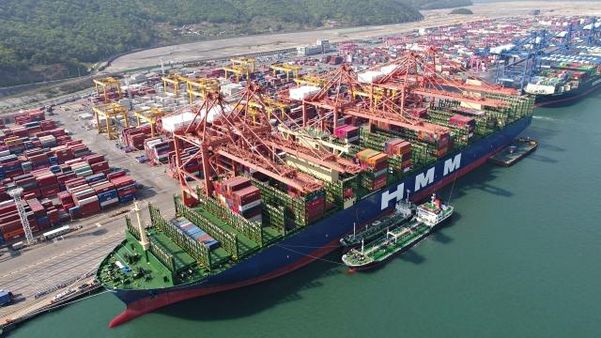– Methanol, which can be easily stored and transported, has been brought into the spotlight as a fuel that can replace LNG.
– MAERSK has already secured a significant amount of methanol, but can they find new suppliers?
HMM, one of the leading shipping companies in Korea, has announced its plan to make massive investments in the new construction of methanol-powered container vessels. Against this backdrop, Hyundai Corporation is preparing to establish methanol supply networks for HMM.
As a result, trading firms responsible for supplying goods and marine fuels are projected to play bigger roles in global markets for methanol which is recognized as an alternative marine fuel. Methanol emits much less SOx and NOx and stays in liquid form at room temperature. Therefore, it can be easily stored and transported, making it unnecessary to pour massive additional investments into existing infrastructure, including ports.
According to trading industry sources, HMM has already signed MOUs for methanol production and supply with five companies including Hyundai Corporation, Proman, PTTEP, and European Energy to stably secure fuels for recently contracted methanol-powered ships. The fifth company not mentioned above did not want its nationality and name to be disclosed. These companies are expected to conduct feasibility studies to supply methanol as fuel at major ports around the world and promote collaboration to produce green methanol.
 HMM’s 24000 TEU Container Ship Algeciras Anchored in Busan New Port/HMM
HMM’s 24000 TEU Container Ship Algeciras Anchored in Busan New Port/HMM
Hyundai Corporation (HC) has engaged in bunkering business for supplying conventional marine fuels to Korea’s shipping firms including HMM but has yet to deal with methanol in chemical trading. The MOU with HMM provided opportunities for HC to conduct relevant research more actively. According to industry sources, given that HMM has already concluded agreements for newly building methanol-powered vessels with Korea Shipbuilding & Offshore Engineering and HJ Shipbuilding & Construction, the MOUs for fuel supply are highly likely to develop into binding definitive contracts.
The three named global companies other than Hyundai Corporation are considered leading businesses in the industry that push ahead with green methanol synthesis based on new and renewable energy. In particular, Proman and European Energy have already signed deals for supplying 100,000 and 300,000 tons of methanol by 2025, respectively, to the world’s number two logistics group Maersk (A.P. Moller Maersk) taking the lead in introducing methanol-powered ships.
The issue is that methanol is globally supplied in a limited manner, making it hard to meet the potential demand disclosed up to now. The market leader Maersk has already secured 1.5 million tons of synthetic and bio methanol per year (as of 2025) from nine partners in the US, Europe, and China for 19 methanol-fueled ships under construction. Maersk has established partnerships with Sun Gas, European Energy, Orsted, Proman, Carbon Sink, and Waste Fuel in the US and Europe and CIMC Enric, Debo Energy, and Green Technology Bank in China, some of which have decided to deliver all of their methanol produced to Maersk.
Considering that the global supply of methanol is currently limited to about 200,000 tons a year, Maersk decided to act in a speedy and nimble manner. The estimated supply is based on the demand of the existing chemical industry and others excluding the sector of marine fuel. Moreover, eco-friendly methanol (green methanol) production technology by synthesizing CO2 and hydrogen using renewable energy still has many limitations. This is why there is growing concern about the future supply and demand of methanol.
As a result, the share of existing marine fuels is forecast to be highly maintained for a certain period of time after methanol-fueled vessels are built, playing to the strengths of dual-fuel ships. Shipyards in Korea and China are expected to construct as many as 100 methanol-powered vessels by 2026. More specifically, shipyards belonging to Korea Shipbuilding & Offshore Engineering are projected to build as many as 54 methanol-fueled container ships. This is attributed to fierce competition among Maersk, HMM, CMA-CGM (France), and COSCO (China).
Among trading firms, Samsung C&T Corporation and LX International, as well as Hyundai Corporation, have engaged in trading methanol for other industries.
Chosun Biz
February 17, 2023

